 By: Dr. Ivan Garcia, DHR Health Family Physician
By: Dr. Ivan Garcia, DHR Health Family Physician
1000 E. Dove Avenue McAllen, TX 78504
For appointments, call: (956) 362-3530
Most insurance plans accepted, including Medicare and Medicaid.
As you walk through a grocery store and notice an older gentleman wearing a “Veteran” hat, it’s easy to overlook the experiences he may carry. We see the hat, but we don’t always see the individual. In 2022, the United States had 16.2 million veterans, yet fewer than half receive care through the Veterans Administration. This leaves family doctors, primary care providers (PCPs), and hospitals on the front lines, needing to be prepared for veterans’ unique needs.
The Health Challenges Veterans Bring Home
Musculoskeletal Injuries: Veterans often have muscle and joint injuries, not only from combat but also from years of running, marching, and carrying heavy equipment. These injuries, particularly in the lower extremities, often lead to chronic pain, with veterans having double the rate of osteoarthritis compared to non-veterans.
PTSD and Moral Injury: Veterans may carry invisible wounds, like Post-Traumatic Stress Disorder (PTSD), a mental health condition triggered by trauma, causing intense reactions even after the danger has passed. Moral injury—feelings of guilt or shame over actions that conflict with personal beliefs—can occur alongside PTSD, emphasizing the need for individualized care by PCPs.
Traumatic Brain Injury (TBI): TBIs happen from blows or blasts, often leading to chronic pain, headaches, and mental health problems. Because these conditions overlap, veterans need a team-based treatment plan, as treating one issue may worsen another.
Depression and Suicide: Adjusting to civilian life can be lonely, leading to high rates of depression and suicide. Male veterans are 1.4 times more likely to die by suicide than civilian men, and female veterans are 1.8 times more likely than civilian women.
Supporting Veterans
Veterans are all around us—they are our neighbors, coworkers, friends, and family. Even I, who sit here writing this article, was once a private in the U.S. Army. Supporting veterans means more than simply thanking them for their service; it’s about listening without judgment and understanding their unique experiences. Their well-being is closely connected to our own. A society that values veterans is one that values resilience, courage, and the strength to face life’s challenges head-on.
The post Beyond the Uniform: Understanding the Health Needs of Our Veterans appeared first on MyRGV.com.
 (2).png)
 16 hours ago
15
16 hours ago
15








 English (US)
English (US)